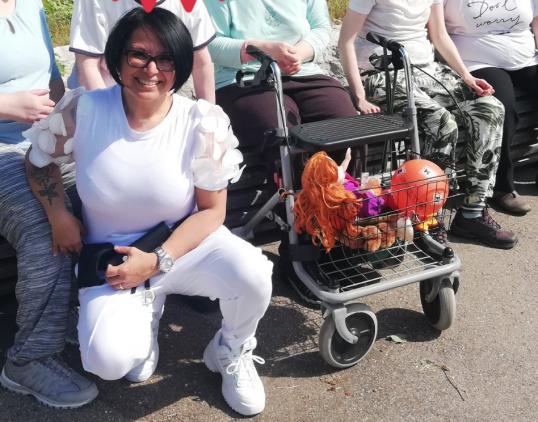“It all started one afternoon in July 2019 while I was on the EURES Facebook page and read about a project recruiting care workers in Germany,” Alessandria begins. “I was intrigued.” At the age of 45, Alessandria was out of work and having difficulty finding a new, stable job. Having been raised in Germany before moving to Italy as a teenager, she was open to moving back to Germany for a new challenge. This project gave her hope.
A training opportunity in the care sector
Alessandria contacted EURES and initially received support from Rosaria Petrillo of EURES Milan. She was then put in touch with EURES Adviser Charlotte Glötzner, of International Placement Services (ZAV) in Nuremberg, who was part of the team working on the project. In collaboration with two Bavarian care providers – the Stiftung Sankt Johannes in Marxheim-Schweinspoint and the Dominikus-Ringeisen-Werk in Ursberg – Charlotte and her colleagues were seeking applicants from around Europe to train as special needs carers with the two organisations.
This would help to address a local skills shortage, as Charlotte explains. “Employers in Germany are experiencing more and more difficulties recruiting qualified special needs care workers,” she says. “The added value of this project is that it combines work and vocational training and the participants receive a salary.”
Employer visits offer a realistic impression
Charlotte invited Alessandria to attend two recruitment days in Bavaria in February 2020. Charlotte had organised the days with Anja Coenen, a local EURES Adviser from the Donauwörth Employment Agency.
On the first day, they provided information about the training programmes and the support available through EURES, including funding opportunities to cover travel, language courses and relocation costs. The applicants were also interviewed by their prospective employers.
On the second day, the applicants visited the premises of the two organisations, including the accommodation that the employers would provide. “This was a bonus for the applicants, because they gained a realistic impression of their future workplace and the environment,” Charlotte says.
Moving forward despite COVID-19
The recruitment days were a great success, as Alessandria and eight other European applicants received job offers. Unfortunately, since then, COVID-19 has brought huge challenges for everyone. As a result of travel restrictions and strict regulations in the care sector, the start of the project was delayed.
However, Alessandria and another participant were able to move to Bavaria in June to begin their training with the Stiftung Sankt Johannes. The other participants began working at the Dominikus-Ringeisen-Werk in October and are currently receiving online German-language training to help them integrate.
Settling in well with support
Despite the unusual circumstances, Alessandria is settling in well with the help of her “impeccably friendly and welcoming” employer. She has also been helped by financial support from EURES through the Reactivate scheme, which she used to pay for her travel to Germany and furnish her accommodation.
“Leaving my family and coming to work here in Germany was not easy,” she says. “But what pushed me to move forward was the opportunity to help others. I feel good and I like the job. I have always loved working with people with special needs.”
“Training and working at my age in Germany, in a beautiful region like Bavaria, seems like a dream to me,” she says. “I take this opportunity to thank all the EURES staff.”
Related links:
Read more:
Find EURES Advisers
Living and working conditions in EURES countries
EURES Jobs Database
EURES services for employers
EURES Events Calendar
Upcoming Online Events
EURES on Facebook
EURES on Twitter
EURES on LinkedIn
Details
- Publication date
- 13 November 2020
- Authors
- European Labour Authority | Directorate-General for Employment, Social Affairs and Inclusion
- Topics
- Recruiting trends
- Social media
- Success stories
- Youth
- Related section(s)
- Sector
- Administrative and support service activities
- Human health and social work activities
- Other service activities
